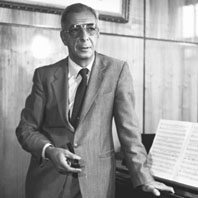Mikael Tariverdiev facts for kids
Mikael Leonovich Tariverdiev (born August 15, 1931 – died July 25, 1996) was a very important composer from the Soviet Union. He was of Armenian background. He led the Composers' Guild for Soviet filmmakers from the very beginning. He is most famous for the music he wrote for movies, especially the score for Seventeen Moments of Spring.
Contents
About Mikael Tariverdiev
Mikael Tariverdiev was born in Tbilisi, Georgia. His parents were Armenian. Even though he was born in Georgia, he lived and worked in Russia. His father, Levon Tariverdiev, was from Baku. His mother, Satenik, was a Georgian Armenian.
Mikael studied music at the Komitas State Conservatory of Yerevan for two years. Later, he finished his studies at the Moscow Gnessin Institute in 1957. He learned from the famous composer Aram Khachaturian.
His Music for Movies and More
Tariverdiev wrote over 100 romantic songs and four operas. One of his operas was a funny one called Count Cagliostro. He also wrote a special kind of opera called a "mono-opera" named "The Waiting," where only one singer performs.
However, Mikael Tariverdiev is best known for his music in many popular Soviet movies. He wrote music for more than 130 films! Some of his most famous movie scores include "Seventeen Moments of Spring" and "The Irony of Fate". You can find a full list of his film music in the article List of film music by Mikael Tariverdiev.
Awards and Recognition
Mikael Tariverdiev received many important awards for his work. In 1977, he won the USSR State Prize, which was a very high honor in the Soviet Union. He also won a prize from the American Music Academy in 1975.
In 1986, he was given the title of People's Artist of Russia. This title is given to artists who have made great contributions to Russian culture. In 1990, he won three Nika Awards for Best Composer. The Nika Awards are like the Russian Oscars for film.
Today, the award for Best Music at the biggest Russian National Film Festival, Kinotaur, is named after Tariverdiev. This shows how much he is still respected.
Later Life and Legacy
In 1990, Mikael Tariverdiev had heart surgery in London. He passed away in 1996. After his death, people who loved his music created the Mikael Tariverdiev Charity Fund. This group also started the Tariverdiev International Organ Competition. This competition helps new organ musicians.
In 2015, a collection of Tariverdiev's music was released in London for the first time in the West. It was a set of three albums called 'Film Music'. His wife, Vera Tariverdieva, helped put this collection together.
Mikael Tariverdiev's Recorded Music
Many of Mikael Tariverdiev's works have been recorded so people can listen to them. Here are some of his recorded music collections:
- Night Pastimes (music from films)
- Quo vadis? (includes his Chernobyl Organ Symphony and his first Organ Concerto Cassandra)
- Moods (features preludes and his third Organ Concerto)
- Remembering Venice (music from films)
- Seventeen Moments of Spring (music from the famous film)
- I Am The Tree (songs where he sings poetry by different writers)
- Instrumentalnye kinokhity (which means Film Music Hits)
- His own versions of Jewish songs
- Prescience of love (a collection of 20th Century Madrigals)
- Graf Cagliostro (his comic opera)
- Mikael Tariverdiev's Avant-Garde (vocal songs based on old Japanese poetry and works by other poets)
- Nostalgia - a Japanese music group called Hide-Hide played his music using traditional Japanese instruments like the semisen and siakuhkati.
Music for Films and Theatre
Mikael Tariverdiev wrote music for many films and plays. Here are some of the well-known films he worked on:
- 1961 “A Man Following the Sun”
- 1962 “Goodbye! Boys”
- 1962 “Welcome, or No Trespassing”
- 1963 “The Big Ore”
- 1968 “King-deer”
- 1972 “Seventeen Moments of Spring” (a 12-part TV series)
- 1974 “The Irony of Fate”
- 1975 “Olga Sergeevna” (an 8-part TV series)
- 1976 “Disappeared Expedition” (a 2-part film)
- 1989 “Endhouse Mysteries”
He also wrote music for musical theatre, including:
- 1965 “Who are you?” (an opera for young people)
- 1973 “Poem about happiness” (a ballet)
- 1981 “Count Kaliostro” (a funny opera)
- 1985 “Gernika” (a ballet inspired by a famous painting by P. Picasso)
- 1986 “Waiting” (a mono-opera, meaning one singer performs)
- 1986 “Girl and Death” (a ballet based on a story by M. Gorky)
Books by Mikael Tariverdiev
Mikael Tariverdiev also wrote a book about his life. It is called «Я просто живу» (I Am Simply Living). It was published in Moscow in 2007.
 | Selma Burke |
 | Pauline Powell Burns |
 | Frederick J. Brown |
 | Robert Blackburn |


